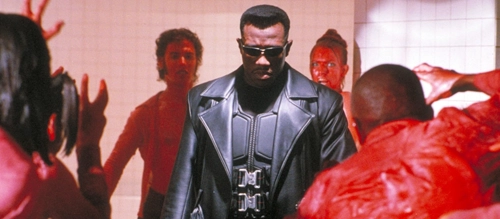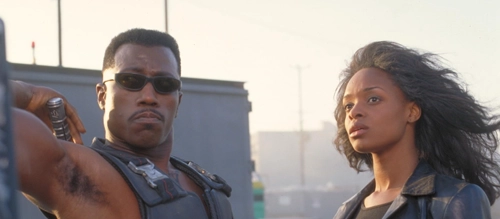
Blade (1998)
Director: Stephen Norrington
Screenwriter: David S. Goyer
Starring: Wesley Snipes, Stephen Dorff, Kris Kristofferson, N’Bushe Wright, Donal Logue, Udo Kier, Sanaa Lathan, Arly Jover
People only seem to have appreciated in hindsight just how revolutionary a film Blade was. A quarter of a century later, it has become much clearer just how much this vampire action movie changed the blockbuster landscape.
Blade tells story of Eric Brooks/Blade (Wesley Snipes), whose pregnant mother was attacked by a vampire, leaving her son to be born a “daywalker” with all of their strengths and none of their weaknesses, save for an insatiable thirst for blood. Trained by the grizzled vampire hunter Abraham Whistler (Kris Kristofferson) to become a living weapon, and provided with tools of destruction and a synthetic serum to keep his darker side in check, Blade battles creatures of the night in Los Angeles and, along with Dr Karen Jenson (N’Bushe Wright), begins to unravel an elaborate plot for vampire domination masterminded by Deacon Frost (Stephen Dorff).
50 years ago, Marv Wolfman created Blade for Marvel’s “Tomb of Dracula” comic. The character, much like Morbius who first appeared around the same time, capitalised on the loosening of restrictions on supernatural monsters and vampires that had been enforced by the Comics Code Authority up to that point.
Screenwriter David S. Goyer (The Dark Knight), who would pen all three Blade movies and direct the disappointing Blade Trinity, really only uses the basic concept of the title character – a formidable black vampire hunter – and otherwise creates his own original backstory, a colourful supporting cast, and sets the rules by which this exaggerated world operates.
There’s plenty of appropriately gruesome horror imagery on show here, from particularly explosive vampire deaths to seeing just how much bodily trauma a vamp can come back from (with the expected accompanying jump scare of course). The upcoming Mahershala Ali MCU reboot would do well to maintain this combination of gore and chills to mark it out from the majority of tamer comic book adaptations.
By the late 90s, Wesley Snipes had already made his name with films like White Men Can’t Jump and Demolition Man, but Blade launched him into a whole other level of stardom and it’s frankly impossible to imagine anyone else bringing the effortless cool stoicism to this character in quite the same way. Kris Kristofferson is completely at ease as a cantankerous and resourceful mentor, and Stephen Dorff is a creepily boyband-handsome big bad and can handle the action choreography with aplomb just like Snipes. It is Donal Logue though, appearing 16 years before his true breakthrough in ‘Gotham’, who steals the show as the hapless vampire punching bag Quinn, hilariously forced to slowly regenerate multiple times after several costly encounters with Blade, most memorably meeting a subway train face-first.
This film did a lot to re-write vampirism from a supernatural affliction to something viral with a pseudo-scientific explanation as would be seen in series like ‘The Strain’. Vampires in this world (Blade aside) are not the troubled souls of more romantic fiction, but instead unfeeling killers; predators at the mercy of their hunger and usually gleeful in the misery their appetites cause humanity.
The plot keeps moving and keeps the tension up throughout, but perhaps loses something in the final act where the vampire master plan is revealed to be unnecessarily convoluted and threatens to unravel with the addition of any amount of real-world logic. Plus, a major character’s death loses its power when it would ultimately be ret-conned in Blade II.

Dishearteningly, this was the second major franchise after Men in Black that decided to ditch its strong female lead for the sequel, a particular crime here considering the key part haematologist Dr Jenson (given heart and attitude aplenty by N’Bushe Wright) plays in saving the day when Blade is down for the count. They don’t even “Fridge” her, just write her out of future films without ceremony.
It’s quite tragic that Blade’s director Stephen Norrington stepped away from the profession following his disheartening experience making The League of Extraordinary Gentlemen in 2003, because he has got a real eye for staging this kind of action. From Blade’s early extermination of a vampire nightclub through to the climactic sword duel with Frost, the staging and choreography always maintains a punchy rhythm and was clearly influential on the following decade of “Gun-Fu” action cinema from The Matrix franchise to Equilibrium.
The release of Blade, X-Men and Spider-Man in quick succession proved comic book adaptations to be the lucrative, must-see extravaganzas for audiences a decade before Marvel launched their shared movie universe. Though the latter two examples probably represented a more seismic, industry-changing shift overall, arguably without Blade, and how it put such a prominent black hero front-and-centre, you might never have got to Black Panther, who funnily enough Wesley Snipes also harboured a desire to play.
Blade may have only launched a franchise with steadily decreasing returns, but its slow-burn impact on multiple genres, from horror to action and superhero movies, cannot be underestimated. A lot of action movies looked like this for years to come, and a more feral, unsympathetic take on the vampire became the most common up until Twilight shifted tastes once more. Blade may not be perfect but it has become iconic and is a good old violent time at the movies.
Score: 20/24

